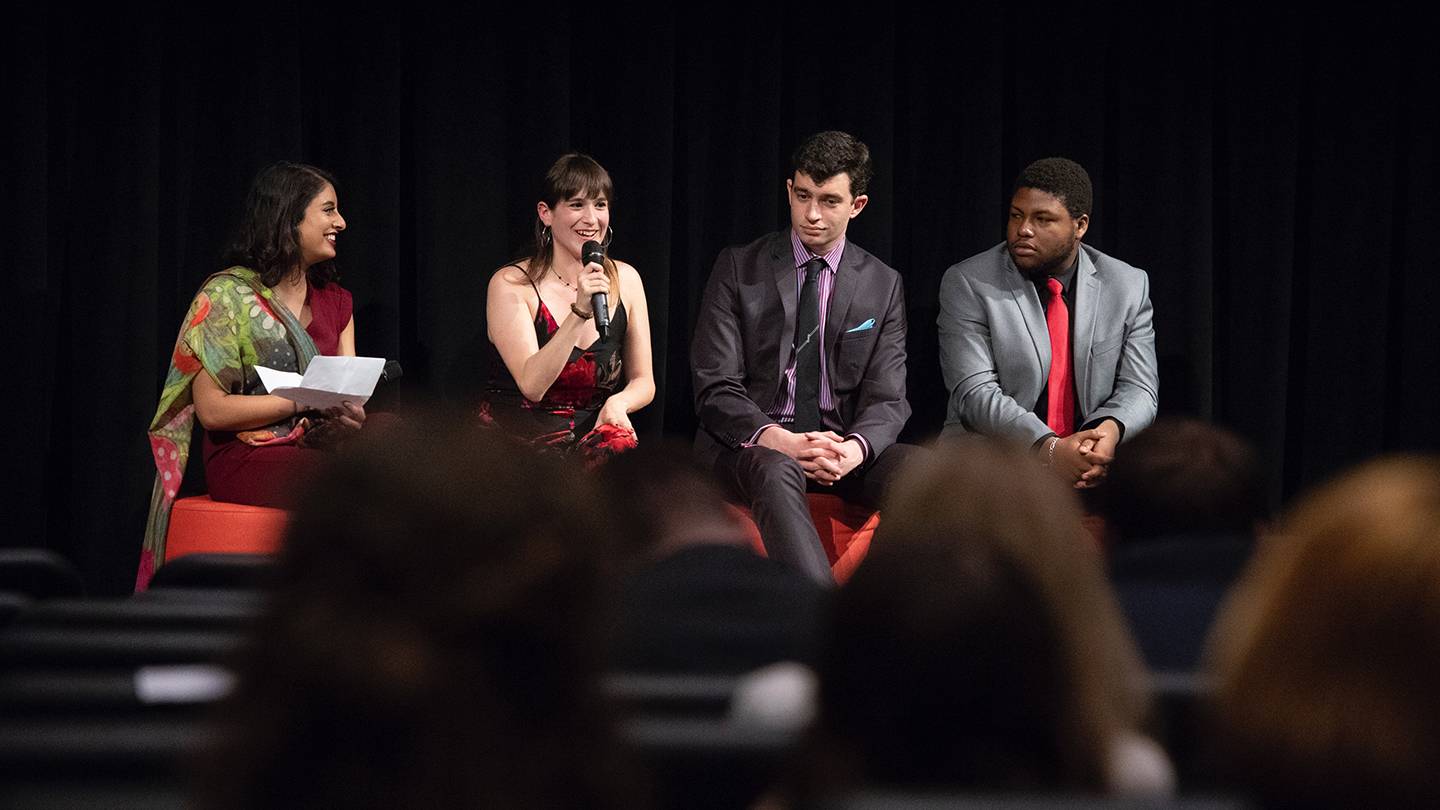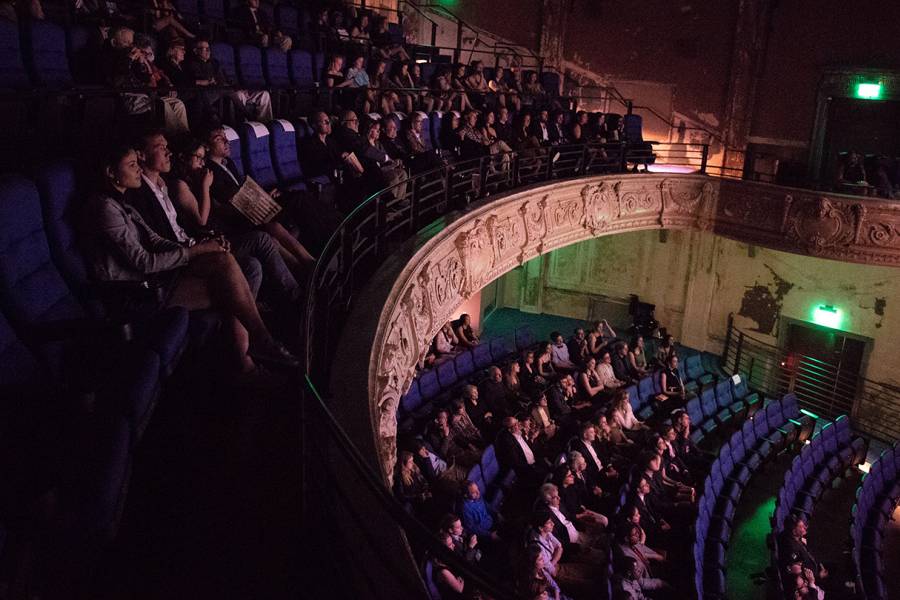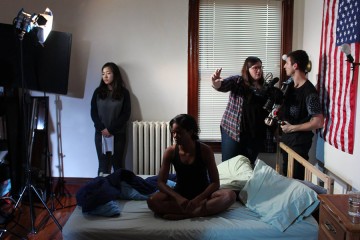Chloe Soares had a full schedule in late April on the evening of the 2018 Grand Premiere at the Stavros Niarchos Foundation Parkway Theatre.
As executive chair of Studio North, Johns Hopkins University's undergraduate student-run production company, the Class of 2018 graduate was a bit of an emcee that evening. She introduced the filmmakers who presented their work to the packed house. She conducted an onstage Q&A with the trio—Kyra Lesser, Irving Nestor, and Bobby Peretti—after their films had screened.
She also announced the recipients of Studio North's 2018-19 grants—film projects by Genevieve Thomas and Jaeyoung Lee and a web series by Vanessa Richards, each selected to receive $1,500 to support their projects in the coming academic year. And at a reception immediately following the screening, Soares chatted with fellow students, parents, and friends from the films' casts and crews, then paused and smiled for a quick photo in front of the Studio North backdrop.
In short, she worked the room the way any proper entertainment professional does at a gala event, the kind of necessary but elusive skill that's difficult to learn in a classroom.
When asked what she and her fellow filmmaking students had learned by working with Studio North, Soares practically suppressed a laugh before waving a hand through the air.
"Everything," she said.
"You don't really understand what goes into making a movie until you actually get on set," she added.
A simple example, she noted: Casting.
"Filmmakers think, 'Oh, I'll just have a casting call,'" Soares said. "But what if nobody shows up? It's not enough to rely on social media. You have to get on backstage.com, reach out to the Baltimore School for the Arts, and know where local actors are looking for work."
Ditto locations. A student filmmaker can write a scene that takes place in a restaurant, a convenience store, or some other business. But shooting that scene involves getting permission from the business owners and the appropriate permits from the city or state. These types of pre-production and production tasks are exactly the kinds of real-world challenges senior lecturer Meredith Ward wanted Hopkins filmmaking students to encounter when she created Studio North with the help of students in 2014.
The university's Program in Film and Media Studies provides a strong foundation in film theory, filmmaking techniques, and screenwriting, and the JHU-MICA Film Center offers state-of-the-art equipment and facilities. But the larger, coordinated process that it takes to transform a screenplay into a movie generally can't be replicated in a single semester.
"The smaller-scale production in our coursework didn't provide the opportunity to be on a big production, where students would learn how to function on an industry set with defined roles," said Ward, who replaces Linda DeLibero as the program's director this month. "That film culture of the industry is what I really wanted to help create."

Image caption: From left: Chloe Soares, Kyra Lesser, Bobby Peretti, and Irving Nestor
Image credit: Homewood Photography
It's an industry culture the students create and sustain on their own. During the 2017-18 academic year, Studio North financed three projects:
Nestor's "Operation First Light" is a comic romp about a battle between boys and girls at summer camp that the director realizes as a series of playful action set pieces. He shot for more than a week at a sleepaway camp in Thurmont, Maryland, recreating the kind of freewheeling experience that inspired this story for the young actors in the cast.
"The Cyclist" is a slice-of-life drama that explores why a young boy might think about selling his bike to buy a gift for his babysitter. Writer/director Peretti received advice on his script from screenwriter Jeremy Pikser, who wrote Bullworth and War, Inc, through Studio North's Saul Zaentz mentorship program.
The irreverent web series "Dollar at the Door" follows a comedy improv troupe and was largely improvised, inspired by director Lesser's involvement in the undergraduate Buttered Niblets troupe. Lesser acts in the series along with fellow Niblet Phoebe Gennardo and alum Tatiana Nya Ford.
Soares says that for these projects, Studio North worked with filmmakers to block out three production periods when crews could have dedicated access to equipment: late-summer before the semester started for Nestor, winter intersession for Peretti, and around spring break for Lesser. That meant planning over the summer for Nestor's shoot, lining up people to be around during intersession, and sticking to a tight production schedule for Lesser.
The filmmakers for each project, working in conjunction with Studio North's student board and committees, planned and budgeted on their own.
"Studio North places an enormous amount of responsibility and trust in the students themselves, and the number of hours that our students-run executive board puts in is massive," Ward said.
A few former Studio North students have already broken into industry. Max Bowens, whose "Motorcycle Memories" was funded by Studio North's inaugural 2014-15 grants, went on to crew with a number of other films, including writer/director Matthew Porterfield's recent Sollers Point. Bowens edited The Empyrean from Australian writer/director Amiel Courtin-Wilson, who called his expressionistic drama a "meditation on the body, the cycle of life and the universal need for compassion, love and intimacy," in an interview with Inside Film magazine. Bowens is currently part of the editor team working on Radegund about Austrian World War II conscientious objector Franz Jägerstätter, a film directed by Terrence Malick.
Andrea Massaro, whose "Bernard Died" was also produced by Studio North's inaugural 2014-15 funds, now works in development at Warner Bros. Pictures. "Sanity," a TV series she co-produced while earning an MFA at UCLA's Producers' Program, was nominated for a scripted series award at the Emmy's 2017 College Television Awards. Massaro is currently working on a web series called One True Loves with a few other program alumni; its first season debuts in July.
Studio North is one of two initiatives Ward catalyzed to provide undergraduates with more practical professional experience. The new Television Writers Room brings in nationally famous screenwriters and trains students to be television writers, with weekly brainstorming sessions and table reads of scripts. That program, like Lesser's "Dollar at the Door" web series, was funded in conjunction with the Saul Zaentz Innovation Fund.
Studio North was initially seeded with funding from JHU's Office of the President through the Homewood Arts Programs. For her part, Soares—emerging studio head that she is—came up with an idea that might help fund Studio North going forward, as its initial funding begins to run out.
"One thing we're going to be launching really soon is what we call the Executive Producers Program," Ward said. "It hooks up [Hopkins] alumni with our current students and enables them not only to offer feedback and advice on projects but also allows the alumni to elect to financially back a project as the executive producer. This is Chloe's brainchild. It's a great idea."
Posted in Arts+Culture, Student Life
Tagged film, film and media studies, filmmaking










